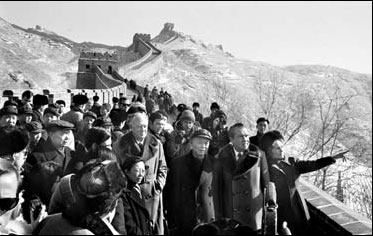Ministry staffer recalls negotiations
Updated: 2012-01-17 08:33
By Zheng Yangpeng (China Daily)
|
||||||||
|
Nixon and his wife tour the Great Wall on Feb 24, 1972. Xinhua |
BEIJING - Forty years after former US president Nixon's visit to China and the signing of the Shanghai Communiqu, Zhao Jihua still remembers every detail of the difficult negotiating that eventually produced the historic document that set the foundation of Sino-US relations for years to come.
"After the communiqu was signed, Premier Zhou Enlai said it was unprecedented," recalled Zhao, who was on the staff of the Foreign Ministry when the negotiations occurred.
And the description of being unprecedented applied in more ways than one. The document's long paragraphs, for example, laid out what disagreements existed between the two sides before agreements, Zhao said. Conventional communiqus, in contrast, avoided mentioning disagreements.
That departure from custom was not what the US had in mind at the start of the talks.
Following Henry Kissinger's secret visit to China in July 1971, he returned on a public trip in October. It was on that second occasion that he brought with him a draft of the joint communiqu, which the US hoped would prove a tangible result of Nixon's visit.
"It was a conventional communiqu featuring normal principles of bilateral relations and stances on world affairs," Zhao said. "The agreement section contained many ambiguities. On the Taiwan question, the US avoided the statement of a one-China policy and talking about withdrawing troops from Taiwan but demanded a peaceful resolution to the cross-Strait issue."
Chinese leaders disapproved that version of the document and insisted that the communiqu identify disagreements before stating agreements.
Kissinger reacted fiercely to China's version, saying Nixon should not have traveled across the Pacific Ocean only to receive such criticism. But Premier Zhou, according to Zhao, used two arguments to change Kissinger's mind.
Zhou said the statement of disagreements showed the two sides had not changed their stances on certain issues, signaling to their allies and friends that they had not "betrayed" them. That also, he said, helped to make the "agreements section" more credible.
Kissinger eventually accepted Zhou's reasoning and agreed to frame the communiqu around China's suggestions. The two sides submitted three drafts, entering into difficult negotiations. The talks became so protracted that Kissinger had to delay his return by a day.
"People might assume that the two sides spent most of the time on the 'agreement part'," Zhao recalled. "But actually the 'disagreement part' was tougher."
The Chinese negotiators insisted on the use of the slogan: "Countries want independence. Nations want liberation. People want revolution" - a standard summary of the state of the world then. But the US side objected to the proposed use of the word "revolution", which could be interpreted as calling for the overthrow of the US government.
China Daily
(China Daily 01/17/2012 page11)












